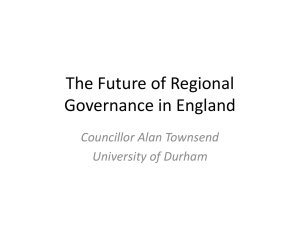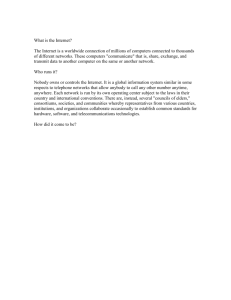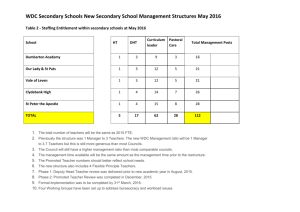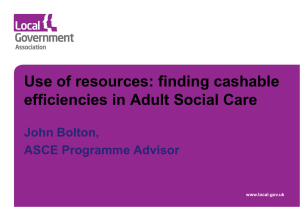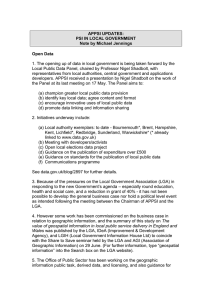APPSI UPDATES: PSI IN LOCAL GOVERNMENT Note by Michael Jennings*
advertisement
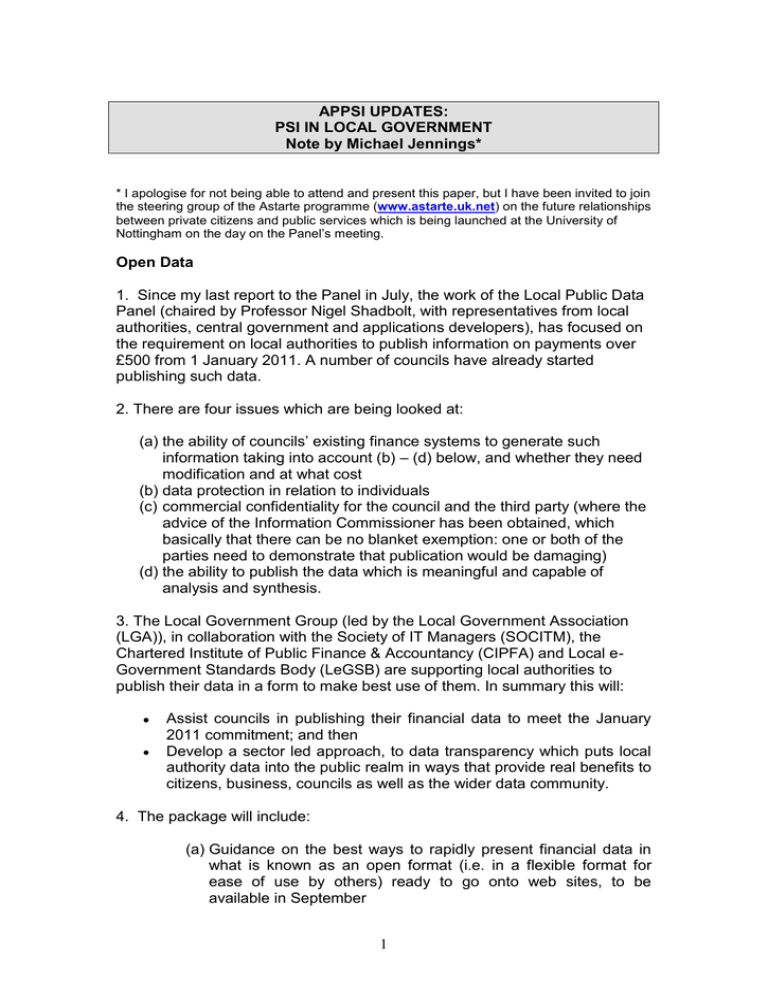
APPSI UPDATES: PSI IN LOCAL GOVERNMENT Note by Michael Jennings* * I apologise for not being able to attend and present this paper, but I have been invited to join the steering group of the Astarte programme (www.astarte.uk.net) on the future relationships between private citizens and public services which is being launched at the University of Nottingham on the day on the Panel’s meeting. Open Data 1. Since my last report to the Panel in July, the work of the Local Public Data Panel (chaired by Professor Nigel Shadbolt, with representatives from local authorities, central government and applications developers), has focused on the requirement on local authorities to publish information on payments over £500 from 1 January 2011. A number of councils have already started publishing such data. 2. There are four issues which are being looked at: (a) the ability of councils’ existing finance systems to generate such information taking into account (b) – (d) below, and whether they need modification and at what cost (b) data protection in relation to individuals (c) commercial confidentiality for the council and the third party (where the advice of the Information Commissioner has been obtained, which basically that there can be no blanket exemption: one or both of the parties need to demonstrate that publication would be damaging) (d) the ability to publish the data which is meaningful and capable of analysis and synthesis. 3. The Local Government Group (led by the Local Government Association (LGA)), in collaboration with the Society of IT Managers (SOCITM), the Chartered Institute of Public Finance & Accountancy (CIPFA) and Local eGovernment Standards Body (LeGSB) are supporting local authorities to publish their data in a form to make best use of them. In summary this will: Assist councils in publishing their financial data to meet the January 2011 commitment; and then Develop a sector led approach, to data transparency which puts local authority data into the public realm in ways that provide real benefits to citizens, business, councils as well as the wider data community. 4. The package will include: (a) Guidance on the best ways to rapidly present financial data in what is known as an open format (i.e. in a flexible format for ease of use by others) ready to go onto web sites, to be available in September 1 (b) Shortly after this, a service hosted by the Local Government Group to convert your data into full linked data format, i.e. a format that will satisfy the widest range of external users, but which also offers the most potential for councils to exploit their data usefully (c) Following from the above, help in finding ways to maximize the value of opening up data (d) Guidance on issues such as data protection requirements in relation to personal data, and how to tackle data licensing which has concerned some councils (e) An on-line facility for collaborative working and learning; and, (f) Where needed, work with software providers to ensure compatibility and support for transparency objectives: the objective is to enable councils to do this easily and cost effectively themselves, but liaison with suppliers will help in ensuring compatibility with council systems. 5. An example can be seen at www.spotlightonspend.org.uk in relation to Windsor & Maidenhead. A further example can be seen at: www.biolap.co.uk/index .php/councilexpenses.html Councils where this has been applied (with the support of Improvement & Efficiency South East (IESE) - a regional body of local government’s Improvement & Development Agency (IDeA) supported by Government) are: Blaby District Council Corby Borough Council Greater London Authority Guildford Borough Council King's Lynn & West Norfolk Mole Valey District Council Reigate & Banstead Richmond upon Thames South Oxfordshire District Council Spelthorne Borough Council Vale of White Horse District Council Waverley Borough Council Windsor & Maidenhead Woking Borough Council 6. Overall 51 councils are known to have published their expenditure data. A list is being compiled by Openly Local which the LGA is feeding into with any new publications. The list can be accessed on: https://spreadsheets.google.com/ccc?key=0AhOqra7su40fdEgtaG4yVFZGVjd YREVIWmprX2dENkE&hl=en_GB Public Sector Information Re-use 7. The National Archives published a Guide to applying the Re-use of Public Sector Information Regulations 2005 at the end of July. 2 8. In August the Government announced that personal searches of the land charges registers would be free – in the light of the Environmental Information Regulations (EIR). This will hit borough and district councils (already affected reductions in other sources of income from development and building control, licences and parking). The position could be exacerbated if refunds for past charges are required. This could be met by increasing council tax, but as the Government is aiming to limit council tax increases over the next few years as well as reducing national grants to councils by 40%, it is more likely to add to the need for reductions in services. Given that the total ―head office‖ and ―back office‖ costs of a council are less than 10%, the effects will be felt in ―frontline‖ services. 9. The Panel has a separate report by John Gray (as part of his annual series of surveys on local government) focused on property information services and the conflicts within government (both within central government and between central and local government) between open data and charging. 10. This has to be viewed in the wider context of data policy on access and charging including INSPIRE, data transparency, freedom of information, data protection, and commercial confidentiality etc., and where the delivery of data and services fits into the wider context. INSPIRE makes a distinction between making data available and providing a service. In the INSPIRE regulation metadata and data should be made available for free for discovery and viewing purposes but that a charge can be levied for download (re-use) or invoked (value-added) services. 11. Article 10 in UKSI 20093157 INSPIRE specifies charging as follows: Charges for public access 10.—(1) Except as provided by paragraph (2), a public authority or a third party must not charge the public for a discovery service or a view service which that authority or third party operates in relation to a spatial data set or spatial data service for which that authority or third party is responsible. (2) A public authority or a third party may charge the public for a view service where that charge secures the maintenance of spatial data sets and spatial data services, especially in cases involving very large volumes of frequently updated data. (3) A public authority or a third party may charge the public a reasonable sum for a service described in regulation 7(2)(c), (d) or (e) which that authority or third party operates in relation to a spatial data set or spatial data service for which that authority or third party is responsible. (4) Where a public authority or a third party charges the public for a view service or a service described in regulation 7(2)(c) or (e), that authority or third party must ensure that e-commerce services are available in relation to that service. (5) Spatial data made available through a view service may be in a form preventing their re-use for commercial purposes. (6) In this regulation ―view service‖ means a service described in regulation 7(2)(b). Public Mapping Service Agreement (PMSA) 12. Following the last Government’s follow-up to the consultation on Ordnance Survey, negotiations took place on a Public Mapping Service Agreement (PMSA) between the Department for Communities & Local Government (CLG), the Office of Public Sector Information (OPSI), and Local 3 Government Association (LGA) and Improvement & Development Agency (IDeA) on behalf of councils, police and fire & rescue authorities, and national parks. 13. The Agreement was announced at the beginning of August. This provides a single long term centrally funded arrangement between the department of Communities and Local Government (CLG) and Ordnance Survey (OS) to provide maps and geographic information from OS to all public sector organisations in England and Wales from 1 April 2011. It replaces three separate agreements – the original one with local government, and subsequent ones with central government and with the National Health Service (NHS). 14. There are important aspects which are still being worked out, such as on governance, derived data, and licensing. It will be important to ensure that: (a) proper governance arrangements are put in place to manage the PMSA and that local government is fairly represented, so as to provide intelligent user input into both the strategic and operational direction of the PMSA (b) the content of the PMSA (data, products, licence and service levels) is in line with users’ current requirements and causes minimal disruption in the changeover from the existing arrangements (c) the PSMA develops over time to meet user needs and provide value for money National Address Gazetteer (NAG) 15. The intention is to build the National Address Gazetteer (NAG) into the Public Mapping Service Agreement. Discussions on technical design and organisational arrangements have been taking place between Ordnance Survey, and the Local Government Information House Limited (a wholly owned subsidiary of local government’s Improvement & Development Agency (IDeA)) and its commercial partner Intelligent Addressing Ltd. At the time of writing a final deal is expecting shortly, but has not yet been struck, but the aim is to secure arrangements in line with the PMSA target dates. Michael Jennings 2 September 2010 4



